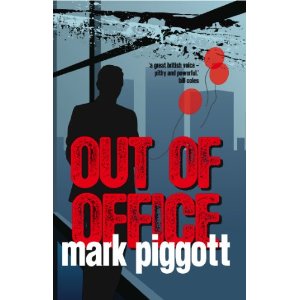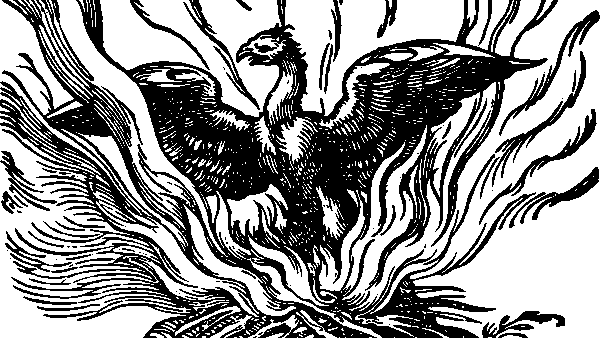 When I lived in America, I went driving along the coast of Maine once. My girlfriend at the time was experimenting with a new photographic technique, some way of punching up the colours so that when I look at our photos everything is more vivid: verdant green grass against a bright blue see and the blinding white of fishing boats. Out of Office is like seeing photos of London using the same technique. It looks like London, but everything is more extreme, more vivid. The summer is hotter, the buildings are more crumbling, the politics more oppressive, the terrorists more pervasive. It feels contemporary and futuristic at the same time, a slightly unsettling but intriguing mix.
When I lived in America, I went driving along the coast of Maine once. My girlfriend at the time was experimenting with a new photographic technique, some way of punching up the colours so that when I look at our photos everything is more vivid: verdant green grass against a bright blue see and the blinding white of fishing boats. Out of Office is like seeing photos of London using the same technique. It looks like London, but everything is more extreme, more vivid. The summer is hotter, the buildings are more crumbling, the politics more oppressive, the terrorists more pervasive. It feels contemporary and futuristic at the same time, a slightly unsettling but intriguing mix.
This technique, of taking realistic events but punching them up a few notches, allows Mark Piggott to interrogate a lot of aspects of contemporary Britain. The familiar divisions between left and right are blown away, as the main character, Hook, doesn’t fit into any real category except perhaps “free thinker”. He doesn’t believe in BNP race-hatred, but nor does he subscribe to the reflexive celebrations of diversity at the council newspaper he works for. He refuses to go along with the ‘correct’ ways of thinking and behaving, and suffers for it.
So it’s a political novel. This much is clear from the first page, when we are told about Hook’s recurring dream of being on a plane and beheading Osama bin Laden and Mohammed Atta to stop them from flying into the Twin Towers, before turning the plane around and flying it straight into the White House, straight at the point where Blair, Bush, Thatcher and other honoured guests are having a nice little barbecue on the lawn. Hook for the rest of the novel is equally hostile to both of these brands of extremists, none of whom speak for him.
“You know what I hate,” snaps Hook, “assumptions. At dinner parties you’re expected to hate the Jews and the Yanks. Down the pub and the greasy spoon you’re expected to hate the Pakis and the queers. So arrogant, don’t you think, people?”
The politics don’t come at the expense of other important elements of a novel, like a compelling plot and believable characters. The plot concerns a campaign of race hatred against an old Jewish pub landlord, ending in his murder, although Hook suspects that it’s more than just local thugs responsible. He’s right, but not in the way he thinks. As he pursues the story, much against the wishes of the council newspaper for whom he his only supposed to produce positive community stories, he finds himself moving further away from his established life. He starts drinking again after long abstinence, even buys a kebab after years of vegetarianism, and becomes increasingly estranged from his wife and daughter as he is drawn into another world, more exciting perhaps, and more dangerous certainly.
There’s a lot happening in the plot, but it’s quite easy to follow. There were one or two parts I didn’t believe – Farzana’s rape, for example, was introduced abruptly and felt as if it was included more for the sake of making a point about Muslim extremists. And I didn’t really understand why Hook’s dad would kill himself. As I understand it, he was angry at Hook because someone told him Hook and his wife had used drugs during her pregnancy and that’s why their child was severely handicapped. But suicide didn’t seem a reasonable reaction to me – cut his son off or hate him, yes, but not kill himself. Anyway those were both minor plot points. The main plot was believable and kept me interested to the end.
I had mixed feelings about Hook. In a lot of ways he’s not very likeable – for example he’s been married twice and cheated on both wives, including having sex with his first wife Karen on his wedding day with wife number two Monica. But he’s more or less the only person in the book who feels honest, as if he’s really trying to do the right thing rather than just reflexively inhabiting one position or another. I admire his obstinacy and his refusal to take the easy route of just fitting in and saying the right things.
The novel is written in the present tense, reinforcing the sense of immediacy. Present-tense writing is something I’ve tried before but never been able to make work, at least at novel length – I started my most recent novel in present tense but had to change it to past because it felt more natural that way. In this book, though, the present tense works quite well. The main problem I had – not being able to tell the back story – is circumvented by having italicised passages in past tense.
This is a book that really makes you think about contemporary Britain and the difficult issues of race and class with which it is still grappling. It’s also a book that resists easy answers and skewers political correctness. Mark Piggott wrote a few months ago in The Independent that British ‘state of the nation’ novels tended to fall under the radar, but he has written one here that deserves a wide audience. It’s a novel that grabs contemporary Britain by the balls and interrogates it until its eyes water. I think it’s worth reading for anyone who’s interested in understanding Britain in 2010, and where it might be in a few years’ time.



There is 1 comment
Thank you for this review. The book sounds pretty intense for me, and I’m not sure I’d make it through. It also depends on how descriptive everything is, but from your review I’m guessing it’s pretty vivid. 🙂
Still, thank you for this. It’s sad that I don’t see a lot of the books you review here in my local bookstores. Sigh.